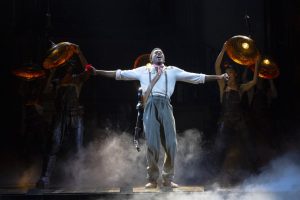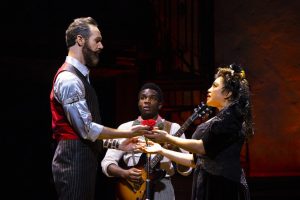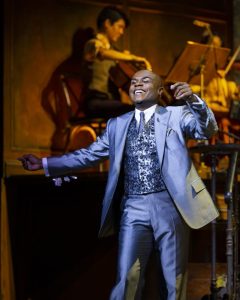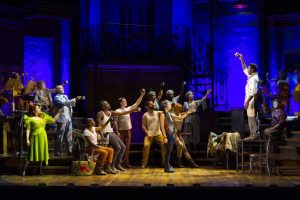
By Dale King
Hadestown, the grim, garishly compelling musical that fuses characters from Greek mythology with imagery from a hellishly demonic industrial underworld, continues through Sunday at the Kravis Center for the Performing Arts in West Palm Beach.
On opening night Tuesday, a full-house audience rewarded the starkly entertaining performance with a sustained standing ovation.
With music, lyrics and book by celebrated singer-songwriter Anaïs Mitchell, Hadestown takes place on a bleakly dressed stage whose intricate set combines elements of a seedy New Orleans French Quarter gin joint with a frighteningly realistic recreation of Hell, complete with the commanding presence of King Hades — portrayed with evil demeanor by Matthew Patrick Quinn, whose speaking voice and vocal talents rumble with gravelly timbre.
Hadestown intertwines two mythic tales — that of youthful dreamers Orpheus and Eurydice and the story of Hades and wife, Persephone. The onstage package is wrapped in hellish array where a gaping, smoke-filled maw opens at center stage, revealing the frightening gateway to Hell.
Don’t fear if your grasp of Greek mythology is a bit rusty. Hermes (Nathan Lee Graham), acting as narrator and master of ceremonies at the New Orleans drinking spot where real musicians line both sides of the grimy structure, identifies the players and situations.
The production is heavy on energy, smoke, glaring lights and superb music. In fact, Mitchell’s captivating melodies — ranging from heavy rock to funky jazz and a single ballad — combine with director Rachel Chavkin’s poetic imagery in scenes pitting industry against nature, doubt against fear and indifference against love.
Despite its sad and often defeatist nature, Hadestown manages to offer a hopeful theatrical experience performed by a vibrant ensemble of actors, dancers and singers.
The show opens on a high note — literally and figuratively — as Hermes, dressed in a flashy silver suit and vest to match, breaks into song, delivering a no-nonsense rendition of “Road to Hell’ as the other performers flow onto the stage. The tune, likening Hell’s highway to a railroad, urges everyone to “ride to the end of the line.”

Soon, Eurydice (Hannah Whitley), an impoverished, meanly dressed young woman shows up, just as the Fates (Dominique Kempf, Belen Moyano and Nyla Watson) are describing the harsh weather and famine of the locale (“Any Way the Wind Blows”).
Hermes introduces Eurydice to his ward, Orpheus (Chibueze Ihuoma), a poor man whose occupation, “muse,” seems a trifle to the community. Hermes tells him not to come on strong with her, but he immediately asks her to marry him. (“Come Home with Me”).
In the meantime, Hades shows up, entering from an elegant second-floor doorway to a beautifully configured wrought-iron balcony. He’s here to take his wife, Persephone (Brit West), back to his underground world after a summertime stay on Earth.
Despite hearing about the never-ending labor endured by the factory workers in Hell, Eurydice is fascinated by the praises sung by the Fates as well as the promise of protection the netherworld offers. The cast returns to the stage for a swing version of “Way Down Hadestown,” one of the show’s best numbers, before Eurydice goes downward.
Hell sure looks like Hell to Eurydice, with sweaty, muscle-bulging workers toiling on a center-stage circular platform that rotates. Smoke is everywhere, bright lights evoke images of fire.

Towering over Eurydice, Hades provokes her with the tune, “Hey, Little Songbird” in a deep, cruel, but masterful voice. He again taunts her with “How Long?” — when she pleads to leave this horrible place despite having signed a contract to become a permanent worker.
When Orpheus realizes Eurydice is gone, he hightails it to Hell. Hades orders the workers to attack him and the Fates tell him to give up hope (“Nothing Changes”). Inspired by Orpheus’s determination, Persephone pleads with her hateful husband to let the lovers go. Orpheus buttresses his gritty offer by playing his finally completed song, which softens Hades’ demonic heart. He clutches Persephone, shares a flower with her and they dance in a rare joyful moment.
The devil king finally allows Orpheus and Eurydice to return to the surface — on one condition. To prove his love, faith and absence of doubt, Orpheus cannot look back at her along the journey.
To tell what happens next would reveal too much. But the audience should remain after the curtain call for a post-finale tribute to Orpheus that may be explanatory.
The Hadestown national tour brings some admirable performers to the Kravis. Clearly, Quinn, as Hades, makes the stage quake with his presence. Graham’s Hermes is a fascinating, quick-witted personage with top notch vocal and acting talents.

West’s Persephone brings dynamism to the stage, as do the Fates, whose voices and dancing abilities are commendable. One of them even plays the accordion. Overall, Whitley and Ihouma bring less depth to their parts, but they do reach emotional highs when required.
The seven-person band deserves applause for providing accompaniment in a show that’s nearly all music. Nathan Koci is a fine pianist and conductor, but trombonist Emily Fredrickson steals the spotlight for tearing off some great brass licks.
As director, Chavkin keeps the hellraising in check. She gets an able assist from choreographer David Neumann.
HADESTOWN plays through Sunday at Kravis Center for the Performing Arts, 701 Okeechobee Blvd., West Palm Beach. For tickets and information, call 561-832-7469 or visit www.kravis.org.